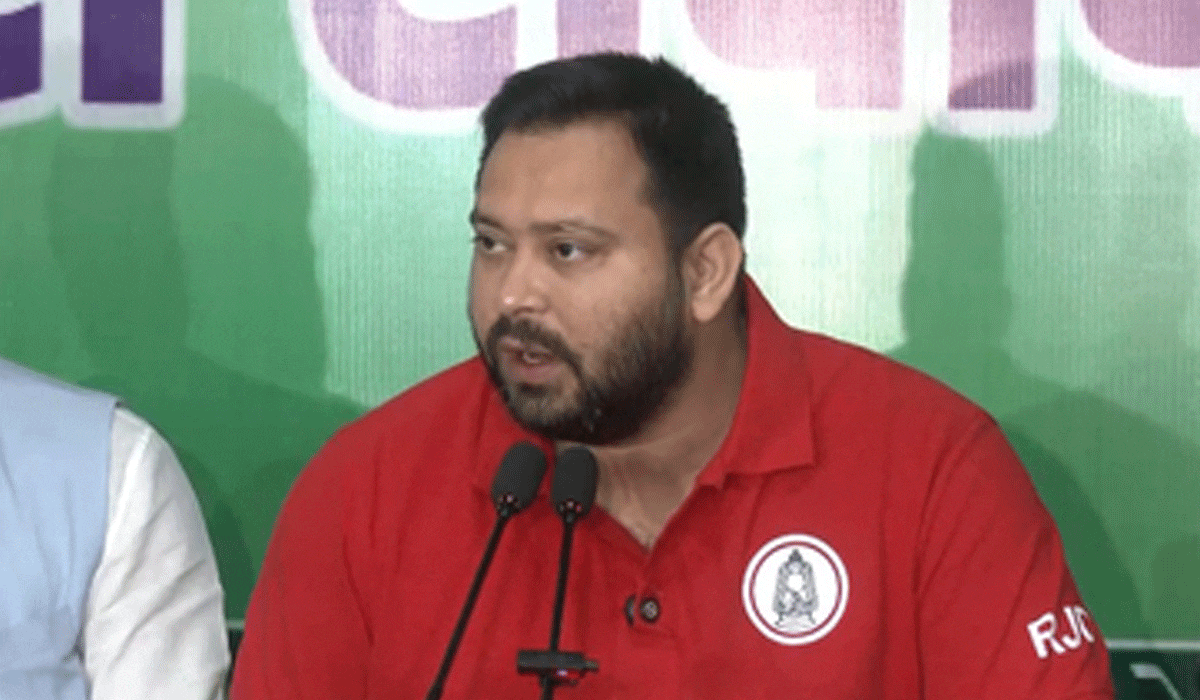Tejashwi plays on NDA turf, tries to hit electoral boundaries with new sops
Relying on his earlier cricketing skills, Rashtriya Janata Dal (RJD) leader Tejashwi Yadav appears to be trying to score a few political runs by driving the ball through two strong fielders placed by Bihar’s Nitish Kumar-led National Democratic Alliance (NDA) team.

New Delhi: Relying on his earlier cricketing skills, Rashtriya Janata Dal (RJD) leader Tejashwi Yadav appears to be trying to score a few political runs by driving the ball through two strong fielders placed by Bihar’s Nitish Kumar-led National Democratic Alliance (NDA) team.
The Opposition Mahagathbandhan bloc’s Chief Ministerial face promised on Tuesday, November 4, to add on to the benefits of two groups where Janata Dal (United) leader Nitish Kumar has already announced schemes to support during his two-decade-long tenure as the head of state government.
Also Read: OPS loyalist Manoj Pandian joins DMK, announces resignation as MLA
Thus, drawing on skills acquired as a politician, Tejashwi may rather have tried to guide the ball through some comparatively weaker defence on the field. But then, these are the slog overs, when the election campaign for the first phase of the Bihar Assembly elections — to be held on Thursday, November 6 — ends in a few hours. The second phase is scheduled for November 11, with results to be declared on November 14.
If elected, he pledged his government’s support for Bihar’s farmers with free electricity supply for irrigation, and additional Rs 300 per quintal for paddy and Rs 400 per quintal for wheat over the Minimum Support Price (MSP). MSP is fixed by the Union government on the recommendations of the Commission for Agricultural Costs and Prices (CACP) for select crops in each cycle annually. It is usually announced before sowing of food grains that are considered remunerative for farmers and hence deserve support. MSP serves as a price guaranteed by the government to protect producers from market fluctuations.
Tejashwi also added that his government will grant Primary Agricultural Credit Society (PACS) representatives the status of public representatives. Additionally, his government would also consider granting honorarium to PACS managers. Incidentally, it was the Nitish Kumar government in 2006 that deregulated the agricultural sector and largely removed government oversight over crop procurement.
In most states, such procurement happened through the Agricultural Produce Market Committee (APMC), run by the state government. Food grains are then sold in mandis (wholesale markets), where farmers sell their produce directly to the Food Corporation of India or the State Farming Corporation at MSP. Nitish Kumar replaced the APMC system with PACS, which are bodies at the panchayat level. These societies serve as a “middleman” in food grain procurement and sell the produce to government agencies.
Critics raise several issues over the system because the application process for PACS is digital, where they claim difficulty in accessing the web in areas without, or with limited, connectivity. Also, many farmers are not comfortable with computers, and sometimes there are technical issues, they claim.
There are also complaints over many small and marginal farmers’ access to PACS, where unscrupulous elements buy their produce to sell it at mandis in Punjab or Haryana. Tejashwi did not complain, but announced adding on to the present system.
Drawing on skills acquired as a politician, he could have perhaps spoken about ways and means for more support to farmers without digital or physical access to PACS, or those who grow crops apart from the more popular paddy and wheat, like oilseeds.
Meanwhile, on women-centric schemes, Tejashwi promised a year-long Rs 30,000 support for women under the “Mai Bahin Maan Yojana”. This sounds close to the Mukhyamantri Mahila Rojgar Yojana launched by Prime Minister Narendra Modi on September 26, where Rs 10,000 had been transferred to the bank accounts of 75 lakh women who had registered till that day.
Starting with the initial financial support of Rs 10,000, the scheme can provide Rs 2 lakh, based on the success of the enterprise, helping women start a business. Nitish Kumar, as is known, enjoys support among a majority of the state’s women voters due to his numerous welfare schemes announced earlier.
Initiatives like Mukhyamantri Balika Cycle Yojana, uniform and scholarship schemes for girls from backward and economically weaker families, and 50 per cent reservation for women in local bodies have helped girls and women.
Nitish Kumar has also taken initiatives in setting up women’s helplines and fast‑track courts to address domestic violence and harassment. Additionally, the pension amount for widows and elderly women has been raised significantly, from Rs 400 to Rs 1,100 per month.
One aspect that Tejashwi Yadav may have considered, drawing from his experience as former Health Minister, is the cause of health workers, especially nurses, with employment pledged within 70 km of their home district.
